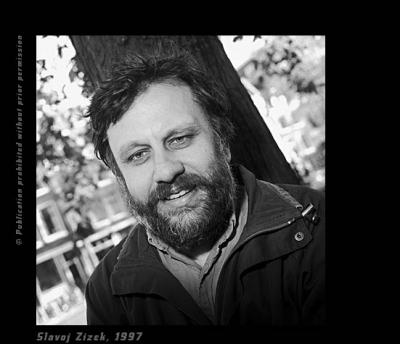
15 + 9 points
Zizek and the Drive by Pieces
March 23rd, 2006 12:32 PM
Below is the text of my e-mail to Professor Žižek, and images of the two main subjects in that e-mail (yes, I wrote Professor Žižek not only about Drive, but about 24, as well!)
23 March 2006
Dear Professor Zizek,
As I'm sure you may have realized from some previous e-mails, a current "challenge" on a San Francisco based activity, sf0.org, is to contact you for your stance on Drive. That's not precisely what I'm going to do - as a hopeful academic myself (I'll be beginning my doctoral studies next year), I know how annoying it could be to be contacted by people with no real interest in my studies.
However, this challenge has led me to read several of your articles in order to familiarize myself with your theories, including "Desire:Drive...," and I also stumbled upon your piece in the Guardian, "The depraved heroes of 24...".
So, I was hoping to do two things: challenge your assessment of the show, and to complete the challenge by asking you about drive - in relation to Jack Bauer.
In the article, you write:
"Therein also resides the lie of 24: that it is not only possible to retain human dignity in performing acts of terror, but that if an honest person performs such an act as a grave duty, it confers on him a tragic-ethical grandeur. The parallel between the agents' and the terrorists' behaviour serves this lie.
But what if such a distance is possible? What if people do commit terrible acts as part of their job while being loving husbands, good parents and close friends? As Arendt says, the fact that they are able to retain any normality while committing such acts is the ultimate confirmation of moral depravity."
My challenge to your assessment is twofold: first, and more simply, I would argue that Jack Bauer and the heroes (dubiously moral heroes, certainly, but heroes nonetheless) of "24" are never able to retain their normality, to live normal lives. This was seen from the very beginning of the show: because of the life he leads, Jack Bauer loses his wife, is unable to maintain a healthy relationship with any woman, and ultimately becomes estranged from his daughter. In the first episode of Season 5, Jack says, "I thought that a guy like me could get a second chance" - as he realizes that his actions haven't just emotionally scarred him, they have branded him as one who can never be a member of the masses that he lives to protect.
The other counterargument comes in the way that "24" portrays those heroes and villains who "perform acts of terror as grave duties." Throughout the show, both the heroes and villains have been shown to be parallel in this manner: just as Jack is willing to go to great lengths, so are Habib Marwan, villain of season 4, his assistants in the Araz family, and Stephen Saunders of season 3. In contrast to Jack, these villains never seem to feel any moral conflict about the acts of terror that they commit. In essence, the easy "moral lesson," that 24 may be providing - which is a lie, but less great of one, I think than you posit - is that heroes and villains alike commit acts of terror, but heroes feel terrible about doing so, even though it is for the greater good. The same lesson was shown in the recent film "Munich," as the Israeli counterterrorists were emotionally destroyed by their actions, while their targets seemed relatively unaffected by what they had done.
This leads me to wonder about your comparison of these morally dubious heroes to Himmler and the SS. Himmler called the job a "dirty" one, not a terrible one. He certainly acknowledged that it was hard to do, but the Nazi argument wasn't that a lesser evil led to a greater good, it was that greater good was being accomplished through legitimate means. In the barbaric/totalitarian view of the Nazis, any other - whether protesting students, family members of resistance fighters, or Jews, homosexuals, or Gypsies - became nonentities. In 24, while Marwan is still seen as someone who can and must be disposed of through whatever means necessary, he maintains his humanity in several scenes throughout the series. Jack wants to hurt and kill him, but never loses sight of the fact that Marwan is a man like any other.
I won't argue that 24 is reactionary - it's on Fox, which, in the last 6 years, has turned into a news network for Republican propaganda - but it's also wholly entertaining, and I see no problem watching it, although I consider myself rather far to the left in the political spectrum. It's terribly frightening that there could be men like Jack Bauer working for us, who have the ability to do commit such violent acts. However, in a case like those depicted on 24, where the problems aren't massive socioeconomic issues that the Nazis put onto the Jewish scapegoats, but are iminent threats of annihilation of entire cities and millions of lives, don't you think Jack deserves some distinction from the SS?
And now for my questions on drive: I can't admit that I fully grasp your arguments, as I'm not terribly familiar with Lacan, but - if you see drive as a sort of mindless "knowledge which brings about satisfaction," - then what do you see Jack's drive as being? I would suggest that it is to provide for the immediate (not ultimate, as with the Nazis) protection of our populace. Going further, what is your stance towards the drive of those (like myself) who watch 24? Do you see within us a search for something relating to American society?
Thank you so much - I really do appreciate this challenge because it gave me the opportunity to familiarize myself with your theories - and I hope this wasn't too much blather, and I'm sorry for the overlong e-mail.
Very sincerely yours,
Dan Venning
23 March 2006
Dear Professor Zizek,
As I'm sure you may have realized from some previous e-mails, a current "challenge" on a San Francisco based activity, sf0.org, is to contact you for your stance on Drive. That's not precisely what I'm going to do - as a hopeful academic myself (I'll be beginning my doctoral studies next year), I know how annoying it could be to be contacted by people with no real interest in my studies.
However, this challenge has led me to read several of your articles in order to familiarize myself with your theories, including "Desire:Drive...," and I also stumbled upon your piece in the Guardian, "The depraved heroes of 24...".
So, I was hoping to do two things: challenge your assessment of the show, and to complete the challenge by asking you about drive - in relation to Jack Bauer.
In the article, you write:
"Therein also resides the lie of 24: that it is not only possible to retain human dignity in performing acts of terror, but that if an honest person performs such an act as a grave duty, it confers on him a tragic-ethical grandeur. The parallel between the agents' and the terrorists' behaviour serves this lie.
But what if such a distance is possible? What if people do commit terrible acts as part of their job while being loving husbands, good parents and close friends? As Arendt says, the fact that they are able to retain any normality while committing such acts is the ultimate confirmation of moral depravity."
My challenge to your assessment is twofold: first, and more simply, I would argue that Jack Bauer and the heroes (dubiously moral heroes, certainly, but heroes nonetheless) of "24" are never able to retain their normality, to live normal lives. This was seen from the very beginning of the show: because of the life he leads, Jack Bauer loses his wife, is unable to maintain a healthy relationship with any woman, and ultimately becomes estranged from his daughter. In the first episode of Season 5, Jack says, "I thought that a guy like me could get a second chance" - as he realizes that his actions haven't just emotionally scarred him, they have branded him as one who can never be a member of the masses that he lives to protect.
The other counterargument comes in the way that "24" portrays those heroes and villains who "perform acts of terror as grave duties." Throughout the show, both the heroes and villains have been shown to be parallel in this manner: just as Jack is willing to go to great lengths, so are Habib Marwan, villain of season 4, his assistants in the Araz family, and Stephen Saunders of season 3. In contrast to Jack, these villains never seem to feel any moral conflict about the acts of terror that they commit. In essence, the easy "moral lesson," that 24 may be providing - which is a lie, but less great of one, I think than you posit - is that heroes and villains alike commit acts of terror, but heroes feel terrible about doing so, even though it is for the greater good. The same lesson was shown in the recent film "Munich," as the Israeli counterterrorists were emotionally destroyed by their actions, while their targets seemed relatively unaffected by what they had done.
This leads me to wonder about your comparison of these morally dubious heroes to Himmler and the SS. Himmler called the job a "dirty" one, not a terrible one. He certainly acknowledged that it was hard to do, but the Nazi argument wasn't that a lesser evil led to a greater good, it was that greater good was being accomplished through legitimate means. In the barbaric/totalitarian view of the Nazis, any other - whether protesting students, family members of resistance fighters, or Jews, homosexuals, or Gypsies - became nonentities. In 24, while Marwan is still seen as someone who can and must be disposed of through whatever means necessary, he maintains his humanity in several scenes throughout the series. Jack wants to hurt and kill him, but never loses sight of the fact that Marwan is a man like any other.
I won't argue that 24 is reactionary - it's on Fox, which, in the last 6 years, has turned into a news network for Republican propaganda - but it's also wholly entertaining, and I see no problem watching it, although I consider myself rather far to the left in the political spectrum. It's terribly frightening that there could be men like Jack Bauer working for us, who have the ability to do commit such violent acts. However, in a case like those depicted on 24, where the problems aren't massive socioeconomic issues that the Nazis put onto the Jewish scapegoats, but are iminent threats of annihilation of entire cities and millions of lives, don't you think Jack deserves some distinction from the SS?
And now for my questions on drive: I can't admit that I fully grasp your arguments, as I'm not terribly familiar with Lacan, but - if you see drive as a sort of mindless "knowledge which brings about satisfaction," - then what do you see Jack's drive as being? I would suggest that it is to provide for the immediate (not ultimate, as with the Nazis) protection of our populace. Going further, what is your stance towards the drive of those (like myself) who watch 24? Do you see within us a search for something relating to American society?
Thank you so much - I really do appreciate this challenge because it gave me the opportunity to familiarize myself with your theories - and I hope this wasn't too much blather, and I'm sorry for the overlong e-mail.
Very sincerely yours,
Dan Venning












Quick addendum to my uneditable (have to work on that, or no?) vote. I haven't watched enough 24 recently, nor have I read Zizek's Guardian article, but it seems that the way in which the world's relationship with Jack crumbles (wife, daughter, etc) is the "lie" Zizek speaks about. Isn't his point that Bauer's "tragic-ethical grandeur" is the relationship between his dirty-deeds-nobly-done and the consequences of those actions - in which the world recognizes that Jack's actions are wrong, while this "terrible price" confirms just how worth the trouble America/democracy/society/etc are.